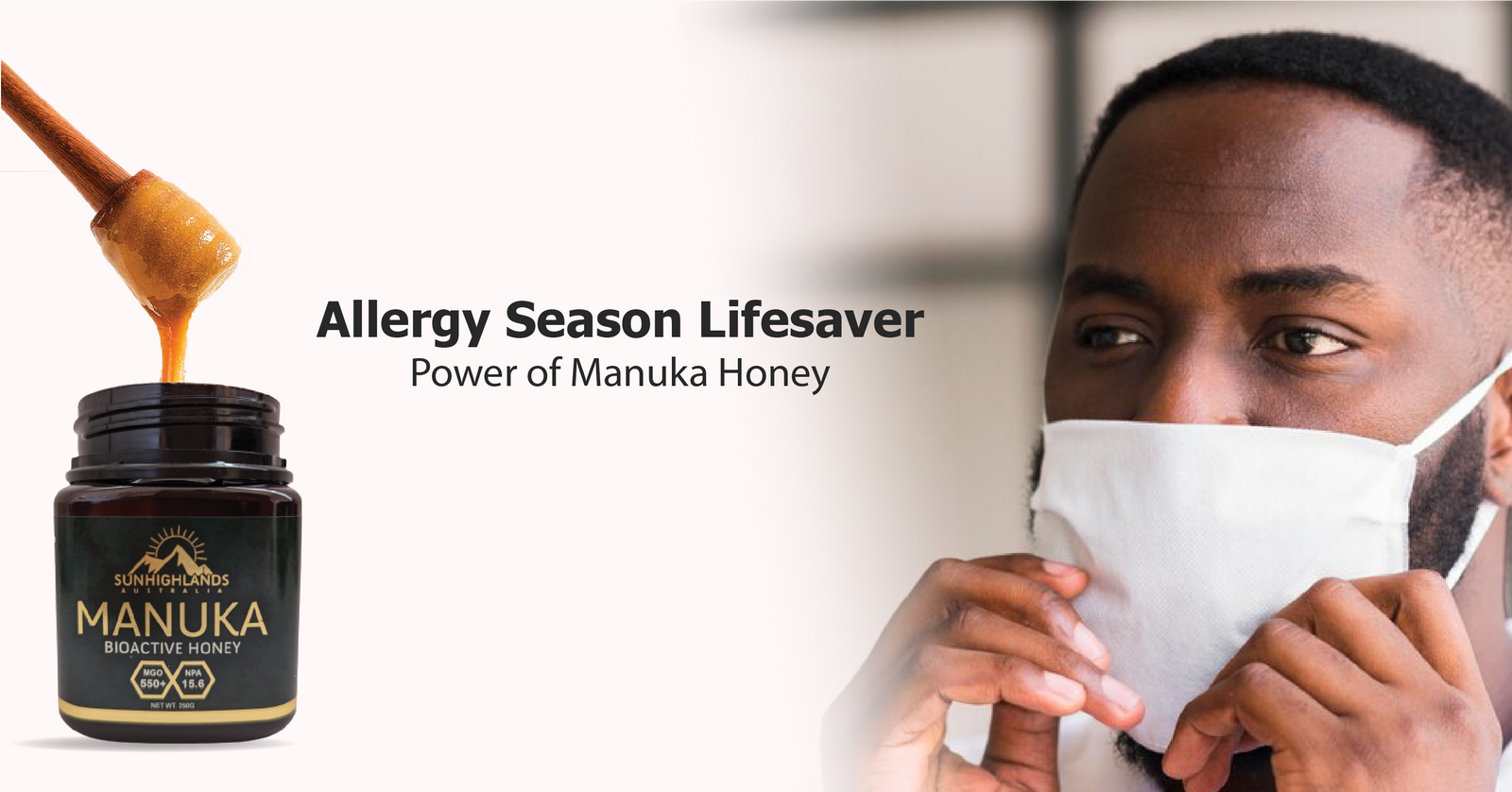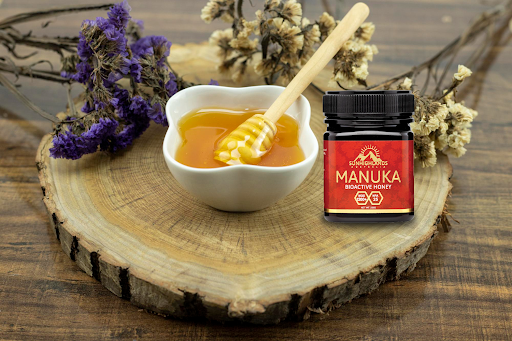Allergy Season Lifesaver: The Power of Manuka Honey

In the realm of holistic healing, few substances hold as much promise and mystique as Manuka honey. Renowned for its unique properties and health benefits, Manuka honey has garnered attention for its potential to alleviate allergic reactions.
Seasonal allergies often make life difficult for numerous people, yet Manuka honey represents a potential solution. The exceptional antibacterial and anti-inflammatory capabilities of Manuka honey enable relief from sneezing, nasal congestion, and itchy eyes, and it is known for its famous properties.
Some claim that Manuka honey effectively builds up a tolerance to allergens over time. But you must be aware that Manuka honey can cause allergic reactions, especially if you are allergic to bee products. This blog will explore how Manuka honey functions for allergies and how to use it safely.
Understanding Allergies
Before delving into the specifics of Manuka honey, it's essential to grasp the nature of allergies. Allergies occur when the immune system reacts abnormally to substances that are typically harmless. Common allergens include pollen, dust mites, pet dander, and certain foods. Allergic reactions can range from mild discomfort to severe anaphylaxis, posing significant challenges to those affected.
What is Manuka Honey?
Honey produced by the bees originates from the Manuka bush in Australia and differs from their primary pollen sources. The substance exhibits antibacterial effectiveness together with anti-inflammatory properties. MGO exists in more significant quantities in Manuka honey than in ordinary honey. Therapeutic benefits from Manuka honey have earned it wide recognition in medical fields for treating skin problems and gastrointestinal and allergen issues.
Is Manuka Honey Good for Allergies?
Research shows that Manuka honey offers medical benefits for allergy patients. Its anti-inflammatory properties help reduce throat irritation while decongesting the nasal passages. Regular intake of manuka honey enables the same allergenic immunity development as local honey.
People apply Manuka honey as a remedy to reduce sneezing and alleviate itching and congestion symptoms. People with an allergy to Manuka honey or honey in general need to take precautions when using it. Begin your consumption of Manuka honey in small doses because an allergic reaction to this food is possible.
Can you be allergic to manuka honey?
Is it possible to be allergic to Manuka honey? People who are allergic to bee products (such as pollen) or have a background of allergy may find Manuka honey irritating. Symptoms of a honey allergy may include itching, swelling, or trouble breathing.
If you have these symptoms after consuming Manuka honey, immediately stop using it. Be sure to test first if you develop an allergic reaction to Manuka honey. Arrange a checkup with your doctor immediately if you notice any problems.
How to Use Manuka Honey for Treating Allergies
A suitable dosage for using manuka honey for allergies is one teaspoon daily. You can take it straight or dissolve it in warm tea or water. Doing so might calm your throat, decrease congestion, and mitigate allergy symptoms. Manuka honey should be directly applied to the skin area affected by allergies. Before using Manuka honey for treatment, start with a small part to check if it causes allergic reactions.
Is Manuka Honey Beneficial for Allergies?
Manuka honey is a natural allergy remedy. Its anti-inflammatory and antibacterial properties enable it to reduce symptoms while building immunity.
People use Manuka honey because it has proven helpful for many allergy sufferers. In many cases, just one tablespoon can improve symptoms when ingested regularly through the allergy season. It is a potent adjunct to your practice, though it won't cure the allergies.
Manuka Honey: Nature's Healing Nectar
First thing first, what exactly is Manuka honey? Well, it’s not your average honey found sitting on the supermarket shelf. What sets it apart from traditional honey is its potent antibacterial and anti-inflammatory properties. These qualities are attributed to the presence of methylglyoxal (MGO), a compound found in high concentrations in Manuka honey.
This compound gives Manuka honey its superpowers and makes it a force to be reckoned with in the world of natural remedies. MGO is believed to contribute to the honey's potency in combating bacteria and reducing inflammation, making it an asset in both wound care and immune support.
The Role of Manuka Honey in Allergies
While research on the specific effects of Manuka honey on allergies is ongoing, several mechanisms suggest its potential efficacy:
- Anti-inflammatory Properties: Allergic reactions often trigger inflammation in the body, leading to symptoms such as itching, swelling, and congestion. Manuka honey can calm that inflammation with its anti-inflammatory properties, which may help alleviate these symptoms by reducing the body's inflammatory response.
- Immune Modulation: Our immune system plays a vital role in how we react to allergens. Manuka honey has been shown to modulate the immune system, influencing its response to allergens. By promoting a balanced immune response, Manuka honey could mitigate the severity of allergic reactions.
- Microbial Defence: Allergies can weaken the body’s defence, leaving you vulnerable to infections. Allergic individuals are more susceptible to respiratory infections due to compromised airways. As Manuka honey is a natural germ-fighting machine, its antimicrobial properties may help prevent or alleviate secondary infections, providing relief from symptoms and supporting overall respiratory health.
Practical Applications of Manuka Honey for Allergies
Integrating Manuka honey into your allergy management routine can be done in various ways:
- Spoonful of Sweetness/Oral Consumption: Consuming a teaspoon of Manuka honey straight from the jar daily is believed to boost the immune system and provide relief from allergy symptoms. Incorporating it into your diet as a natural sweetener or spreading it on toast can make it a delicious addition to your daily routine.
- Topical Application: Applying Manuka honey directly to irritated skin or mucous membranes can soothe inflammation and reduce itching. Mixing it with a carrier oil or incorporating it into homemade skincare products allows for targeted application to affected areas.
- DIY Face Mask: You can simply whip up a face mask using Manuka honey and a dash of cinnamon. Apply it to your face, let it work its magic for 15 minutes, and rinse off to reveal soft, glowing skin.
- Nasal Rinse: Mixing Manuka honey with saline solution to create a nasal rinse can help alleviate nasal congestion and inflammation associated with allergic rhinitis. Regular use may provide ongoing relief from nasal symptoms.
- Allergy Support Tonic: Combining Manuka honey with other natural remedies such as ginger, turmeric, and lemon in a homemade allergy support formula can enhance its effectiveness. Mix a tablespoon of Manuka honey with warm water, a squeeze of lemon and a pinch of turmeric for a powerful allergy-fighting tonic. This concoction can be consumed as a tonic or added to hot water for a comforting drink.
Precautions and Considerations
While Manuka honey holds promise as a natural remedy for allergies, it's essential to exercise caution and consult with a healthcare professional, especially if you have existing allergies or medical conditions. Additionally, individuals with a known allergy to bee products should avoid using honey in any form to prevent adverse reactions.
Conclusion
So, there you have it, folks – the buzz on how Manuka honey can help you kick allergies to the curb. With its anti-inflammatory properties, immune-boosting benefits, and natural germ-fighting abilities, it’s no wonder this golden nectar has been a staple in natural remedies for centuries.
Manuka honey's remarkable healing properties make it a valuable ally in the battle against allergies. Embracing the power of nature’s golden nectar may just be the sweet solution you’ve been searching for.
FAQ’s
Do people with an allergy to bee products need to avoid Manuka honey?
Yes, it's possible. Some allergic reactions to Manuka honey occur primarily among people with bee product allergies.
Does Manuka honey help with allergies?
Manuka honey can reduce inflammation, which can help with symptoms like congestion and itching.
How to Use Manuka Honey for Allergies?
Consume one teaspoon of Manuka honey daily. You'll mix it into warm tea or water.
Can I take too much Manuka honey?
It is safe for most, but anyone allergic to bee products should avoid it. Always begin with a low dose and observe how your body responds.





